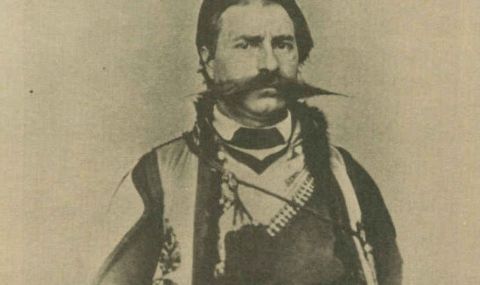On February 22, 1918, Panayot Ivanov Hitov - a Bulgarian outlaw and Chetnik leader, an activist of the national revolutionary movement, died.
He was born in 1830 in Sliven. In 1858, he joined the detachment of the Sliven voivode Georgi Trunkin, and after his death, he headed it.
In April 1864, he went to Belgrade to gather Chetniks. Due to the Serbian government's ban on the formation of Bulgarian chetniks on its territory, Hitov secretly moved with his chetniks to Bulgarian lands and settled in the Western Balkan Mountains.
In the spring of 1866, he moved to Wallachia and entered into contact with G. S. Rakovski.
On April 28, 1867, Hitov crossed the Danube with a detachment of about 30 people near Tutrakan, between the villages of Pozharevo and Dunavets. The standard-bearer of the detachment was Vasil Levski. When crossing the Danube, weapons were delivered to him by the old and respected by Bulgarians and Turks patriot Grandfather Mosht Nikola from the village of Malak Preslavets. Hitov headed for the Balkan Mountains with his detachment and spent some time in the region of Kotel and Sliven. His detachment did not aim to raise an uprising, but to carry out a revolutionary march to agitate the Bulgarian population.
In August 1867, together with his detachment and the detachment of Filip Totyu Hitov, he headed for Serbia along the ridge of the Stara Planina Mountains.
After his retreat to Serbia, Hitov lived in Belgrade as a pensioner of the Serbian government. He became a supporter of the idea that the Bulgarian liberation movement should unite with the Serbian actions against the Turks. In the period 1869 - 1871, Hitov presented his views to Vasil Levski, with whom he corresponded. Without listening to the advice of the Apostle, in the summer of 1871, Hitov signed an agreement with the Montenegrin voivode Matanović for a simultaneous uprising in Bulgaria, Bosnia, Herzegovina and Albania. In April 1872 Hitov became a member of the Bulgarian Revolutionary Committee in Bucharest.
After Levski's death, he played an important role in the committee, although he continued to live in Belgrade. In August 1875, he chaired the meeting of the Bulgarian Revolutionary Committee, which decided to declare the Stara Zagora Uprising. According to the plan, Hitov was to lead a detachment, but this was not carried out due to the suggestion of the Serbian government. For the same reasons, he did not lead a detachment during the April Uprising.
During the Serbian-Turkish War of 1876, Panayot Hitov was the voivode of one of the detachments of the Bulgarian volunteers. In July, the commander of the Moravian Army, General Mihail Chernyaev, appointed him the chief voivode of the detachments of Filip Totyu, Ilio Voivode, Zhelyu Hristov and Hristo Makedonski. He also received the authority to introduce order in the newly liberated lands. The volunteers, commanded by Panayot Hitov, carried out joint, coordinated actions with the Serbian army. This is evidenced by the numerous letters between him and Serbian officers such as Yevta Jovanovich - commander of the 2nd battalion, Lieutenant Colonel Malinovski - commandant of the position at St. Stefan, etc.
The commander was a Bulgarian volunteer detachment during the Russo-Turkish War of 1877 - 1878.
After the Liberation, Hitov lived in Ruse. He took part in political life. In 1885, he headed the Union in Sliven. Because of his struggle against the regime of Stefan Stambolov, he was thrown into prison.
By 1900, he was a member of the local Macedonian society. In April 1901, he was a delegate to the Eighth Macedonian-Adrianople Congress of the Kurtbunar Society.
Panayot Hitov died on March 22, 1918, at the age of 87, in the city of Ruse and was buried in the city cemetery. In 1978, his remains were moved to the Pantheon of the Bulgarian National Revivalists. The remains of many famous Bulgarian national revolutionaries were also transferred there, including Lyuben Karavelov, Zahari Stoyanov, Stefan Karadzha, Baba Tonka, Nikola Obretenov, Panayot Volov, Angel Kanchev, etc.
